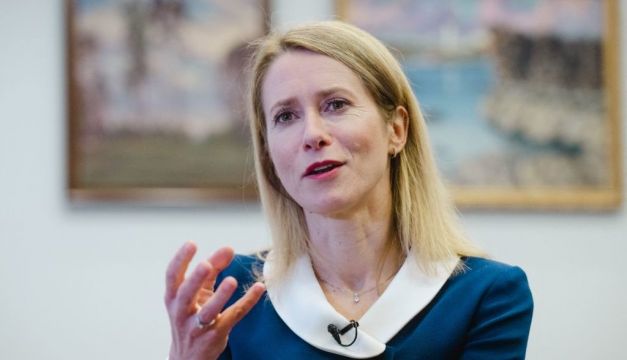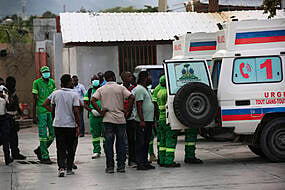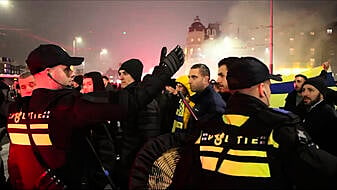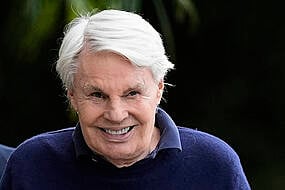One of Europe's most staunchly pro-Ukrainian governments faces a challenge in a national election in Estonia on Sunday from a far-right party that is seeking to capitalise on dissatisfaction with the rising cost of living.
If, as opinion polls predict, prime minister Kaja Kallas' liberal Reform party wins the election and successfully crafts a coalition it would cement the Baltic nation's pro-European direction. Estonia would also stay on course to adopt more green energy and continue to accept refugees from Ukraine.
However, promises from the far-right EKRE party to slash energy bills by opposing the transition to green energy are proving popular in some parts of the country, as is a vow to shut the door to further Ukrainian refugees.
Kallas and EKRE leader Martin Helme both told Reuters this week they hope to lead the next coalition government.
"I hope to stay prime minister, but it's up to the voters to decide", Kallas said in an interview, after casting an early vote by internet, as the majority of Estonians are expected to do.
However it is possible – although not very likely – that the election could produce a coalition led by EKRE, whom Kallas pledged she would never work with, said Aivar Voog, a pollster at Kantar Emor.
Helme said his supporters, who mostly come from rural regions, trust his party to handle the cost-of-living crisis, as well as to curb immigration, and take care of their security in the face of "a possible war with Russia".
EKRE's popularity surged during the Covid-19 pandemic and benefited from Estonia's inflation reaching 23 per cent inflation last summer, the highest in the euro zone and more than double its average.
"People are really scared about the future, and the main parties, especially the governing parties, have no real answers," said Helme.
He said his government would support Ukraine in its fight against Russian forces who invaded a year ago, but would not accept any more Ukrainian refugees.
The nation of 1.3 million, of which a quarter are ethnic Russians, accepted 62,000 Ukrainian refugees in 2022.
"This has put an enormous strain on our budgets, our accommodation, our education system, our medical system, but also our overall cultural picture," Helme said. "We can't possibly take in any more".
Acknowledging the growing support for EKRE in the weeks before the election – "maybe due to, you know, tough times" – Kallas said voters must choose between what she called "two totally different ways for Estonia".
"We are supporting the open, friendly, European-minded, smart country, I would say, and EKRE is looking more into itself, that we should stick to our own interest, not to help Ukraine," she said.
All major Estonian parties support raising defence spending to 3% of gross domestic product, however none have put forward a coherent policy to fund the expansion while the economy is in slowdown, Swedbank's chief Estonian economist Tonu Mertsina said.
Green plans
Ida-Virumaa, a largely Russian-speaking region in eastern Estonia, is one of the places where EKRE has made steady gains since the 2019 election, partly because of fears about the decline of the jobs in the oil shale industry.
Oil shale, the rock mined and burned for decades to meet a large part of Estonia's energy needs, is abundant in the region but jobs have either been lost or are at risk because of moves toward greener energy.
Kallas' government has pledged to move away from producing any electricity from oil shale by 2035, turning to wind and solar power for energy instead.
EKRE has pledged to supply oil-shale-produced electricity to households at 3 cents per kilowatt-hour, instead of about 20 cents per kWh it currently costs.
To achieve this, party pledged to stop honouring European carbon permits, which make oil shale power costly.
"We will not allow the so-called Green Deal to destroy our own energy production and our own economic basis", Helme said.

Kallas said only the green transition can bring power prices down and added that even in Ida-Virumaa people understood there was not a long-term future for oil shale.
"That's why we are working on trying to attract more investments to Ida-Virumaa so that they can have different jobs there, not just oil shale industry," she said.
Diana Berseneva, a lecturer at a local college, said she hopes the region will develop more once the 356 million euros allocated from the European Union's green transition fund reaches it, but fears it might not be not enough to jump start industries comparable with that of oil shale.
"The future seems very cloudy for local people, because they don't hear [from the government] what will replace the oil shale industry", Berseneva said. "If it's closed down, people will go away," she added, as a chemical odour from a nearby oil shale processing plant hung in the air.







